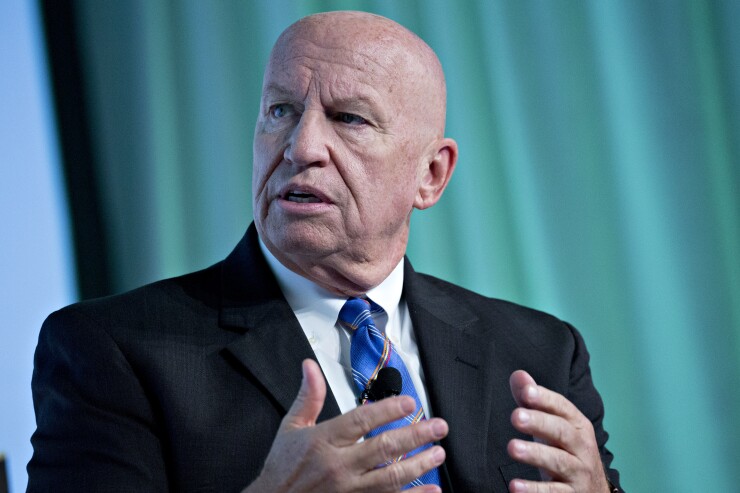WASHINGTON – House Ways and Means Committee chairman Rep. Kevin Brady won’t support an expansion of tax-exempt private activity bonds or a restoration of advance refundings.
The Republican from Texas made this clear in remarks to reporters on Tuesday – one day after President Trump released his infrastructure plan, which would expand and use private activity bonds for public purpose infrastructure projects.
Brady said PABs have “been expanded over the years sort of at a steady pace – now’s the perfect time to have a discussion about refocusing them,” according to Tax Analysts’ Tax Notes.

“What I hope we would do is look at the existing private activity bonds, where my last estimate showed about 12% of that funding or thereabout was actually used for infrastructure, and only a bit more for industrial development,” he said.
Brady said he wants to “refocus more of that to those infrastructure and regional projects that those bonds were originally designed to do.”
The committee chairman’s remarks are similar to those he made during the tax reform debate last year, just before the House proposed a bill that would terminate tax-exempt PABs after Dec. 31.
The Senate bill would retain these bonds and the final tax law changes that were enacted into law in December also retained them.
Brady’s views make municipal market participants nervous that he might use any infrastructure legislation that comes before his committee as an opportunity to further restrict PABs.
President Trump hosted a meeting Wednesday with a dozen House and Senate Democrats and Republicans to talk about his infrastructure plan.
One of the lawmakers was Rep. Bill Shuster, R-Pa, chairman of the House Transportation and Infrastructure Committee, who has been pushing for an increase in the gasoline tax to fix the Highway Trust Fund.
The ailing HTF, backed by fuels taxes, provides federal grants to state and local governments for highways and mass transit.
He told Fox News that an infrastructure plan has to have “real revenues” to pay for spending increases. He said gasoline taxes are user fees and should be raised to prevent the HTF from going broke.
The House Transportation and Infrastructure Committee announced its plans for fiscal 2019 on Wednesday and said that its legislative priorities for the year will include enacting an infrastructure investment bill, as well as renewing a water resources bill.
Trump’s infrastructure plan aims to shift more responsibility for funding infrastructure projects to state and local governments, Fitch Ratings said in a paper on Tuesday.
“Fitch Ratings believes that providing funding from tax revenues could be challenging for some state and local governments as many have already raised revenues in recent years to fund infrastructure investments and general revenue growth has been slow,” the rating agency said.
“Many states have implemented transportation funding increases in recent years at a time of federal inaction,” Fitch said.
“This will limit their willingness to pursue the additional revenue increases required by the proposal.”
The new tax law’s cap on the federal deduction for state and local taxes “further limits state and local governments' flexibility to generate the funding called for in the administration's plan,” the rating agency said.
In a report released Wednesday, Standard and Poor’s said the Trump plan “poses a unique challenge for state and local governments to come up with at least 80% of the funding” for projects and that not all of them will have the financial flexibility to meaningfully tap in to the program … at not without some creative solutions.” The rating agency pointed out that it currently has nine states on negative outlook.
“The biggest opportunity to jumpstart rural infrastructure may … be to consider bundling of assets,” S&P said.
For example, a public-private partnership arrangement called the Penn Bridges project is aiming to develop, design, construct and maintain 558 geographically dispersed structurally deficient bridges across the Commonwealth of Pennsylvania, it said.





